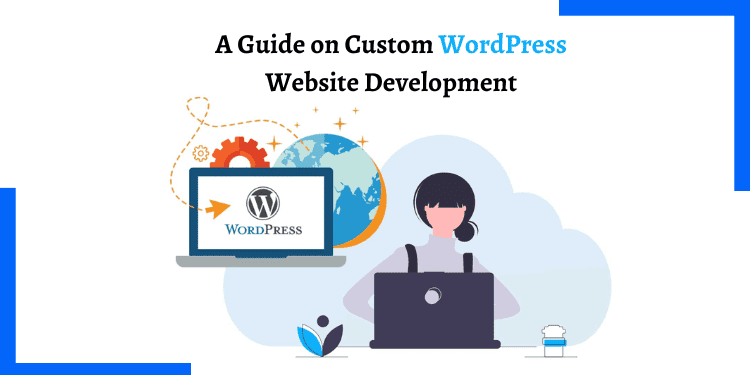
Website Development Services
|
Getting your Trinity Audio player ready...
|
Why Website Development Still Matters in 2025
In today’s digital-first world, your website is more than just an online presence—it’s your brand’s first impression, a sales engine, and a trust builder. Whether you’re a small business, a startup, or a large enterprise, having a fast, responsive, and scalable website can make or break your digital success. Two of the most sought-after approaches in modern website development are WordPress websites and custom-built websites. Each comes with its own set of advantages, depending on your goals, budget, and long-term strategy.
WordPress Website Development: The Go-To Choice for Flexibility and Affordability
WordPress powers over 43% of all websites on the internet today, and it’s no accident. Known for its user-friendly dashboard, robust plugin ecosystem, and endless design flexibility, WordPress is an ideal platform for businesses that want professional websites without spending a fortune.
A skilled WordPress development service includes custom theme design, plugin development, SEO optimization, and ongoing support. Whether you’re launching a blog, an eCommerce store using WooCommerce, or a business portfolio site, WordPress offers scalable options that grow with you.
Moreover, the availability of drag-and-drop page builders like Elementor and WPBakery empowers non-technical users to manage their websites efficiently post-launch.
Custom Website Development: Built from Scratch for Performance and Precision
Custom websites are built from the ground up using frameworks like Laravel, React.js, or Node.js. This approach is ideal for businesses with unique functionality requirements or those who prioritize performance, security, and scalability.
When you opt for custom website development services, the entire project is designed around your exact needs. Unlike template-based WordPress sites, a custom site doesn’t come with code bloat or limitations. It’s optimized for speed, tailored UX/UI, and can integrate deeply with other platforms or APIs like CRMs, ERPs, or booking systems.
While it’s a more resource-intensive option, the ROI is often higher for businesses that need a competitive edge or expect large volumes of traffic.
WordPress vs. Custom: Which Website Development Approach Is Right for You?
This is one of the most common dilemmas faced by businesses seeking digital solutions. The answer depends on your business type, budget, and functionality needs:
| Feature | WordPress Development | Custom Website Development |
|---|---|---|
| Development Time | Faster | Longer |
| Cost | Budget-friendly | Higher upfront investment |
| Flexibility | Moderate (plugins & themes) | Extremely high |
| Maintenance | Easier for non-tech users | Requires developer support |
| Performance Optimization | Moderate | Highly optimized |
| Security | Good with plugins and updates | Very strong (code-level control) |
If you need a website quickly and cost-effectively, go with WordPress. But if you’re planning for a scalable, high-performance application that aligns exactly with your business logic, a custom website is the way to go.
SEO and Mobile Optimization in Website Development Services
Regardless of whether you choose WordPress or custom development, SEO optimization is non-negotiable. Search engines prioritize websites that are fast, mobile-friendly, and semantically structured.
WordPress SEO can be handled with tools like Yoast SEO or Rank Math, allowing you to control meta titles, schema markup, and on-page elements easily. On the custom development side, developers implement SEO best practices like optimized routing, lazy loading, semantic HTML, and fast-loading media.
Responsive design is equally essential. With over 60% of web traffic now coming from mobile devices, every modern website must be optimized for all screen sizes and tested across various browsers.
Maintenance & Scalability: Planning Beyond Launch
Building a website is just the beginning. Ongoing maintenance, performance monitoring, plugin/theme updates (for WordPress), or security patches (for custom sites) are all part of a solid digital strategy.
WordPress websites benefit from large support communities and a wide range of ready-made tools for backup, performance monitoring, and uptime tracking. On the other hand, custom websites typically require a dedicated team or agency to handle updates and bug fixes but offer more control and fewer third-party dependencies.
When scalability becomes a concern (such as increased traffic, content volume, or database size), custom websites often have the upper hand in terms of performance tuning and server-side optimization.
Conversion-Driven Design: UX/UI Is Key
A beautiful website is useless if it doesn’t convert. Both WordPress and custom website development services now include UX/UI design as a core element. Modern website development focuses on human psychology, intuitive design, fast loading, and easy navigation.
A good developer or agency ensures your site is not just attractive but conversion-friendly—incorporating CTA buttons, funnel structures, lead generation forms, and live chat functionality.
Why Hire Professional Website Development Services?
Many small business owners try DIY website builders only to end up frustrated with slow speeds, poor SEO rankings, or limited design options. Hiring a professional website development service gives you access to:
- Experienced developers and designers
- Optimized coding standards
- Better security and compliance
- Faster project turnaround
- Ongoing support and maintenance
- Integrated SEO from the ground up
Whether you go with a WordPress agency or a full-stack development team, you’re investing in your brand’s digital future.
Real-World Use Cases
- A real estate agency might benefit from a custom-built platform that includes property search filters, CRM integration, and live maps.
- A blogger or content creator may thrive with a WordPress website featuring a responsive theme, ad placements, and SEO-friendly structure.
- An eCommerce store might begin on WooCommerce (WordPress) but later migrate to a custom solution as order volume increases.
These examples show that the best solution isn’t always one-size-fits-all. A professional consultation can help determine the most cost-effective and scalable route.
Choose the Path That Matches Your Vision
Whether you’re starting from scratch or revamping an outdated website, choosing between WordPress development and custom website development depends entirely on your unique needs. WordPress offers affordability and ease of use, while custom solutions deliver unmatched performance and flexibility.
The digital landscape is more competitive than ever. Your website is your foundation. Make it count by partnering with experienced developers who understand not just coding—but your business goals.



